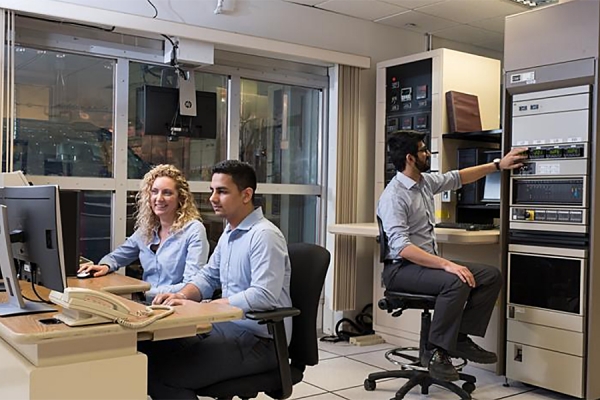 Co-op students hone their skills in the Automotive Research and Development Centre.
Co-op students hone their skills in the Automotive Research and Development Centre.
The announcement earlier this week that Stellantis will invest $3.6 billion in its Canadian operations to accelerate the move to electric vehicles is good news for UWindsor researchers, says dean of engineering Bill Van Heyst.
The funding secures the future of assembly plants in Windsor and Brampton in support of the company’s electrification strategy. The plans include expansion of UWindsor’s Automotive Research and Development Centre to house the first Stellantis battery lab in North America.
The facility links industry and academic researchers and was the site of the May 2 announcement event, attended by Stellantis North America chief operating officer Mark Stewart, Canadian prime minister Justin Trudeau, Ontario premier Doug Ford, senior ministers from both governments, and other officials and community leaders.
“These investments reaffirm our long-term commitment to Canada and represent an important step as we move toward zero-emission vehicles that deliver on our customers’ desire for innovative, clean, safe and affordable mobility,” said Stewart.
Dr. Van Heyst noted that Stellantis has been a long-term partner of the University of Windsor and, in particular, the Faculty of Engineering.
“As an academic institution, we will be training the next generation of automotive engineers with a focus on electrification and, given the recent announcement, our graduates will now be able to find meaningful employment within the Windsor-Essex region,” he said.
The Automotive Research and Development Centre will house two centres of competency — in electric vehicle and battery pack testing — establishing the facility as a major hub of research and development for the company across all stages of production. It will add more than 650 highly skilled engineering jobs in various areas to support Stellantis’ growth in electrification, with a focus on core technology areas: electrified propulsion systems, batteries, power electronics, electric machines, motor controls, energy management, and embedded software.
Since the University-owned centre opened in 1996 as a partnership with Chrysler Canada, it has hosted many exciting events, but none more exciting than Monday’s, said engineering professor Peter Frise, director of the Centre for Automotive Research and Education.
“This announcement marks another important step in this unique partnership between a large multinational company and a major university,” Dr. Frise said. “I anticipate the focus on electric vehicles and batteries will drive change and research projects that will benefit faculty, staff, and our students for years to come.”
Vincent Georgie, the University’s associate vice-president, external, welcomed the chance for local talent, universities, colleges, and start-ups to participate in the development of the electric vehicle ecosystem: “This investment strengthens our relationship with one of the leading global manufacturers and innovators, providing a wealth of opportunity not only for our province but for UWindsor researchers, faculty, students, and graduates.”
The federal and provincial governments have pledged up to $513 million each in support of these investments.
Trudeau said the deal to advance made-in-Canada electric vehicles represents backing the country’s workers and future.
“We’re building a world-class Canadian auto industry, an innovative economy, and a clean, strong future for everyone,” he said. “This is what a healthy environment and a healthy economy looks like.”
